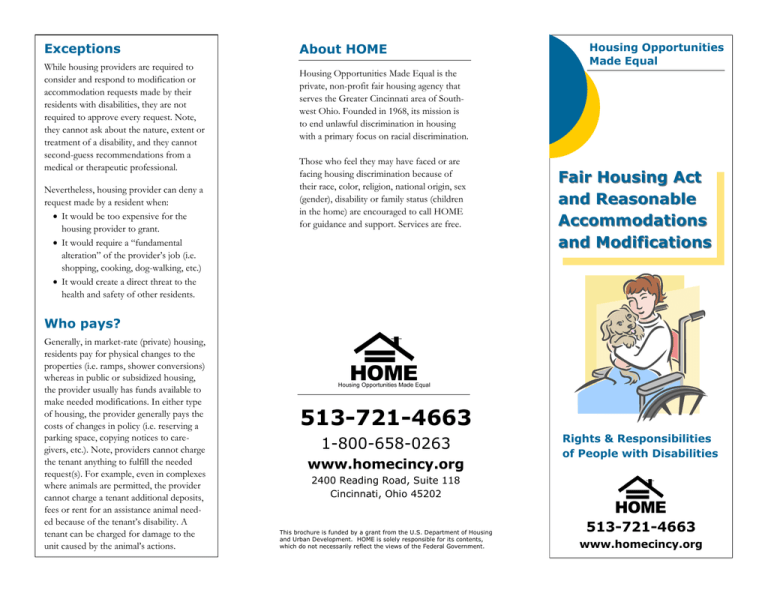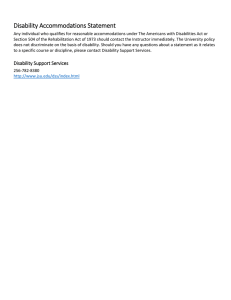About Reasonable Accommodations and Modifications
advertisement

Exceptions While housing providers are required to consider and respond to modification or accommodation requests made by their residents with disabilities, they are not required to approve every request. Note, they cannot ask about the nature, extent or treatment of a disability, and they cannot second-guess recommendations from a medical or therapeutic professional. Nevertheless, housing provider can deny a request made by a resident when: It would be too expensive for the housing provider to grant. It would require a “fundamental alteration” of the provider’s job (i.e. shopping, cooking, dog-walking, etc.) It would create a direct threat to the health and safety of other residents. About HOME Housing Opportunities Made Equal Housing Opportunities Made Equal is the private, non-profit fair housing agency that serves the Greater Cincinnati area of Southwest Ohio. Founded in 1968, its mission is to end unlawful discrimination in housing with a primary focus on racial discrimination. Those who feel they may have faced or are facing housing discrimination because of their race, color, religion, national origin, sex (gender), disability or family status (children in the home) are encouraged to call HOME for guidance and support. Services are free. Fair Housing Act and Reasonable Accommodations and Modifications Who pays? Generally, in market-rate (private) housing, residents pay for physical changes to the properties (i.e. ramps, shower conversions) whereas in public or subsidized housing, the provider usually has funds available to make needed modifications. In either type of housing, the provider generally pays the costs of changes in policy (i.e. reserving a parking space, copying notices to caregivers, etc.). Note, providers cannot charge the tenant anything to fulfill the needed request(s). For example, even in complexes where animals are permitted, the provider cannot charge a tenant additional deposits, fees or rent for an assistance animal needed because of the tenant’s disability. A tenant can be charged for damage to the unit caused by the animal’s actions. 513-721-4663 1-800-658-0263 www.homecincy.org Rights & Responsibilities of People with Disabilities 2400 Reading Road, Suite 118 Cincinnati, Ohio 45202 This brochure is funded by a grant from the U.S. Department of Housing and Urban Development. HOME is solely responsible for its contents, which do not necessarily reflect the views of the Federal Government. 513-721-4663 www.homecincy.org Fair Housing and People with Disabilities Since 1988, the federal Fair Housing Act has included protections for those with disabilities to ensure they have an equal opportunity to rent or purchase the home of their choice. Under the Act, a “disability” is any physical or mental impairment that “substantially limits” one or more of a person’s major life activities. Examples of such impairments include conditions such as autism, asthma, cancer, anxiety, depression, HIV/AIDS, seizure disorders, multiple sclerosis, diabetes, hearing or vision limitations, dementia, or alcoholism. “Disability” does not include those who currently use illegal controlled substances. All real property (houses, condos, apartments, lots, etc.) rented or sold for the use or intention of use as a home or residence is covered by this law. All involved in the transaction must abide by the law: property owner, HOA, condo board, builder, broker, agent, advertiser, site manager, lender, insurer, etc. All residents, including those with disabilities, must fulfill the stated obligations of the contract, such as paying the rent or mortgage, caring for the property, and getting along with neighbors. Types of Discrimination Housing providers may be violating the law if they: Refuse to rent or sell a property Direct applicants to specific offerings or properties Require forms not requested of others Charge additional fees or deposits Bar residents from using certain amenities Deny reasonable accommodations or modifications. Accommodations/Modifications Housing providers must allow those with disabilities an equal opportunity to use and enjoy their homes. To do so, they must allow for reasonable accommodations (changes in policies or procedures) and for reasonable modifications (changes to the physical structure of the property). Residents must make the request, as a housing provider cannot presume to know what an individual needs. The request(s) may be made at any time in the relationship — during the application process, upon movein, throughout tenure, and upon departure. Requested changes must be necessary to address the resident’s disability. Any request must be “reasonable” in that it does not place an undue financial or administrative burden on the housing provider. Housing providers must respond to the request in a timely manner. If the disability is obvious, (i.e. a blind person who needs to use an assistance animal) the request should be granted without further discussion. Where the disability may not be apparent (i.e. asthma, depression, cancer), it is permissible for the housing provider to request documentation of the disability (but not specifics about it) and the need for the requested change to allow the resident to use and enjoy the home. Documentation may be provided by a medical, social service, or mental health professional who can confirm the disability and the person’s need. Common Requests Requests may be made to address any physical or mental disability. Common requests include: Reserved parking near unit Visual smoke alarm or doorbell Live-in caregiver (background check is OK) Caregiver access to laundry, mailboxes Assistance animal Extra notice before spraying or painting Questions? Contact us: Housing Opportunities Made Equal 513-721-4663 (HOME) “Ask A Question” button www.homecincy.org February 2015





